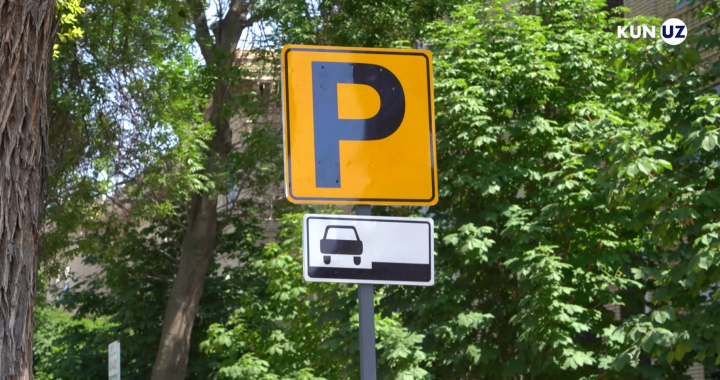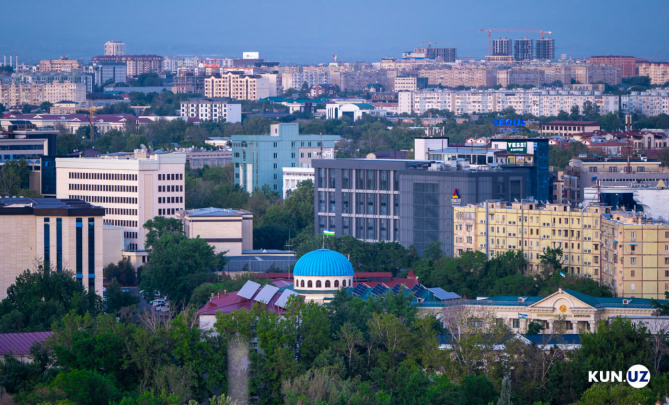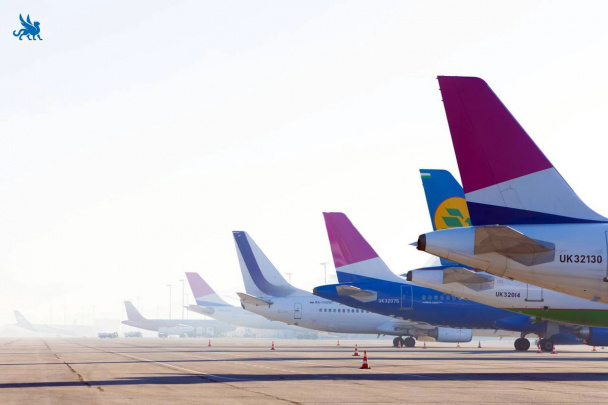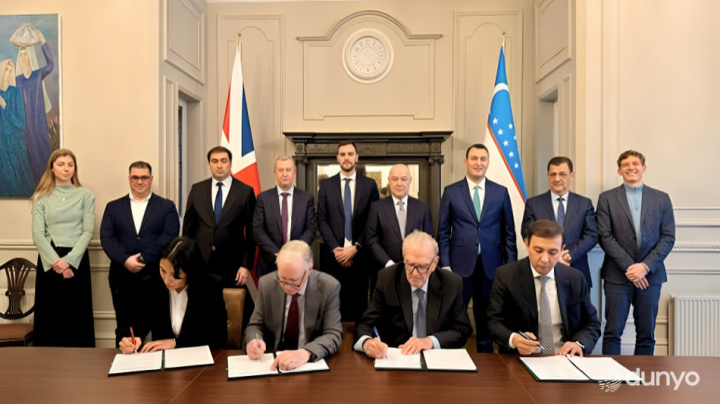Minister of Transport speaks about bus intervals, parking meters, multi-storey car parks and trams
Transport Minister Ilhom Mahkamov promised that the interval of buses in Tashkent will be reduced to 3-4 minutes, and even to 2 minutes during peak times. He also answered questions about the delay in the establishment of parking meters, the construction of multi-storey parking lots and the return of the tram.
On April 8, a presentation of new buses brought from China took place in Tashkent. Minister of Transport Ilhom Mahkamov also participated in it and answered journalists’ questions within the framework of the event, Kun.uz correspondent reported.
According to the minister, 300 12-meter electric buses, 500 12-meter CNG-powered buses and 18-meter 200 CNG-powered buses are being purchased from the Chinese brands “King Long” and “Yutong” – the total cost of a thousand vehicles is $210 million.
“The price of a thousand buses has become $210 million. By the end of April, all 1,000 buses will be produced by factories in China. Today, 592 out of a thousand buses have left the factories and are on the road. Now 233 have arrived in Tashkent. By April 20, everything will leave the factories. Due to the traffic on the borders of China and Kazakhstan, it takes 10-12 days for the buses to arrive on the road,” Ilhom Mahkamov said.
- Separate traffic lanes were established for buses, but these lanes were not separated by plastic or iron fences. That is why there are violations among drivers or buses getting stuck in traffic. Are there any future plans to separate these lanes with physical barriers?
- There is a continuous line in the traffic rules, and there is a fine for those who cross it. Special recorders are now installed on each bus. Buses will record all the cars blocking their way, turning impossible places into parking spaces, and the data will be sent to Traffic Safety Department. The most effective punishment in this process is a fine. After paying the fine twice, they will try not to violate it.
As you said, to separate it with a separate barrier, we need to build a separate large infrastructure. It will be BRT (bus rapid transit). In the process, it is necessary to adapt stations, build separate bridges or underpasses for pedestrians. Today, we are in the business of providing quick solutions. We have also established a project office on this infrastructure in cooperation with the Tashkent city administration, the Ministry of Internal Affairs, and the Ministry of Transport. There are 34 major corridors in the capital, and together with this project office, we selected 13 corridors. In 2023, all 13 corridors are being developed for cross-traffic capability, right-of-way, and public transport priority on roads.
Currently, 1,100 buses are operating in Tashkent. 460 of them are small-capacity Isuzu. In addition to the existing MAN and Mercedes Benz buses, an additional 1,000 large-capacity buses are being imported, adding up to a total of 1,900 large-capacity buses. Therefore, 200 of them are 18-meter buses. Of course, this reduces congestion, shortening the intervals by 3-4 minutes. During peak hours, we extend the intervals to 2 minutes.
It was a good policy for us to buy a thousand buses outright. When a thousand buses arrive, our only task will be to improve the infrastructure on the roads.
- According to the presidential decision No. 59, from April 1, new, flexible tariffs for public transport should be introduced, ticket prices should change. Why is this practice delayed? What is the current stage of the project?
- It has not delayed. Once the buses arrive, the fares will be announced. Once the prices are determined, we will announce them to the public. With these processes, the tariff change will take place on May 15. New tariffs will be introduced from May 15.
- Let’s talk about paid parking meters. In the decision No. 111 signed by the President, it was established that this system had to be introduced in November last year. In this regard, the names of 10 streets were also announced. Why is this also delayed? What stage is it now? When will their installation begin?
- Of course, project work on these parking meters has also been carried out. In this case, the permeability of the streets should not decrease. Taking this into account, the design works have been completed. The establishment of parking meters is not given directly to one organization, but distributed to organizations on the basis of a tender – there are many applicants. The tender will be announced in May.
- Could you please answer one more question: decision No. 59 also provides information on multi-story parking lots. If the decision was made on February 16, if I am not mistaken, the project should have been developed and submitted to the Cabinet of Ministers within 1 month. The deadline has expired. What happened? Can you share some preliminary information about the project? In which areas of Tashkent are planned to build such parking lots? Are the locations selected?
- Mainly 4 large areas were selected from the center. After the decision is made, it will be appropriate for us to discuss it in more detail. The main ideology is that places around which there is no possibility of “parking” or places where people and personal vehicles congregate a lot are being placed. There will be 5- or 7-storey parking lots, we will try to fit the lower two floors underground. It should be developed very well, because there are places where engineering-communications has passed. These are required issues to be worked with designers.
Our draft decision is ready. These days we will introduce it to the Cabinet. It will be the decision of the Cabinet of Ministers.
- What solutions are being made in the subway? There is also high traffic. Although the number of stations and trains has increased, the problem remains.
- The reason is that people’s mobility is increasing. Road widening as a solution is a mistake. Building bridges over roads is also not an effective solution. As soon as you solve the problem of one intersection, you move the traffic to the next intersections.
Together with the city administration and the Ministry of Internal Affairs, we developed a transport macro model of the city of Tashkent – this is the first thing that has been done. 2 years ago, our honorable President instructed executives to prepare the master plan of Tashkent city. We brought experts from Turkey and the Russian Federation, analyzed for 2 years, studied passenger flow and developed a macro model.
This is not something that will be introduced in 1-2 days. This is a concept that requires a complete rethinking of all 34 corridors in the entire city of Tashkent. It is currently undergoing detailed design. We will explain this in a separate briefing later.
- When will it be transferred to the gross contract system? This would cancel the “daily plan” for bus drivers.
- True, we are tasked not only with buying a new bus, but also with the task of abandoning the old system and switching to a new one. The first tenders for the gross contract will start from April 15. 167 routes have been organized, and we hold tenders for these routes with foreign experts. From May 15, public transport in the city will start working only on a gross-contract basis.
- Isn’t there a plan to return the tram?
- Now, one thing must be said... You raised the drainage issue, you are talking about traffic jams in the subway and on roads. Now experts are telling us the biggest solution: “Start the work with the tramway connecting New Tashkent with old Tashkent; now if you introduce the construction of a tram in the city of Tashkent, you will face more traffic jams”.
Traffic jams occur during the construction of the tram, not after it runs. It takes a lot of time. Therefore, I think that soon we will present to our President the tram project connecting New Tashkent and old Tashkent.
- The last stage of the construction of metro stations on the Kuylyuk-Sergeli route remained. Tests are now underway. When will it be commissioned for public use?
- We will launch 5 stations from April 25. That is, from the Kuylyuk 7th station to the 12th station. 3 stations are still under construction.
We voted on the issue of choosing names for metro stations named with numbers until April 18. The people themselves choose the names of the stations.
Related News

08:54 / 03.02.2026
Residents granted free nighttime parking under Tashkent’s new permit system

19:44 / 16.01.2026
Tashkent leads Central Asia in world’s safest cities ranking

11:50 / 13.01.2026
Uzbekistan sets new aviation targets to strengthen regional air travel

17:11 / 17.12.2025



